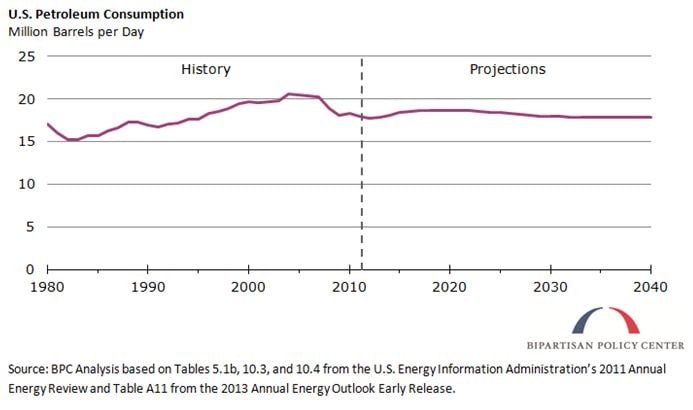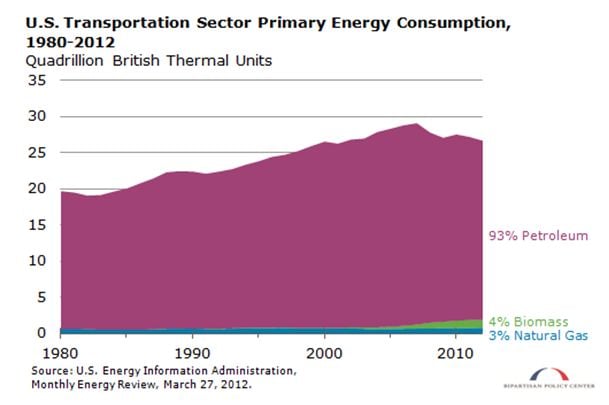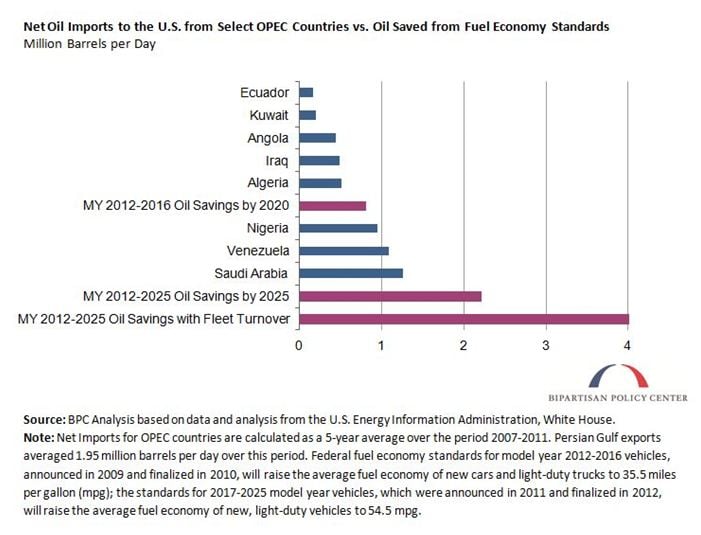Reversing Trends: Declining Petroleum Consumption and Crude Oil Imports Likely to Persist in Coming Years
These trends of flat or declining petroleum consumption and crude oil imports are likely to persist. The Energy Information Administration estimates that U.S. petroleum consumption will remain below 19 million barrels through the year 2040, due in large part to continuing progress on fuel economy and alternative fuels.***

The majority of petroleum (70 percent) is consumed for transportation, a sector that accounted for approximately 28 percent of total primary energy consumption in the United States in 2012.**** Total energy consumption in the transportation sector steadily increased from 1973 to 2007, when it peaked, and has since dropped by 8 percent to 26 quads in 2012. The fuel composition also changed in recent years. Petroleum accounted for 93 percent of total transportation sector energy consumption in 2012, down from 97 percent in 2000. Biomass energy consumption rose to 4 percent of the total in 2012, up from 1 percent in 2000, and natural gas represented 3 percent of total in 2012, approximately the same share as in 2000.

For decades, the most important policy-driven improvements in vehicle efficiency have been the federal corporate average fuel economy (CAFE) standard. One of the most significant policies to promote alternatives to petroleum-based fuels for the U.S. transportation sector has been the renewable fuels standard (RFS), which?in combination with other federal incentives?has brought significant volumes of ethanol into the vehicle-fuel market.
The implications of new automobile energy efficiency standards for domestic oil use are particularly profound when compared to the current level of oil imports. As the figure below shows, new fuel economy standards to be phased in between 2011 and 2025 will reduce oil consumption by an estimated 2.2 million barrels per day by 2025, which is more oil than net U.S. imports from any single OPEC country.

Improved vehicle fuel efficiency will complement new supplies of petroleum and increased use of alternative fuels to enhance America’s energy security, improve environmental quality, and reduce the U.S. economy’s exposure to world oil price volatility. BPC’s Strategic Energy Policy Initiative recommended continued improvements to efficiency in the transportation sector, given the many benefits.
* BPC analysis based on Tables 5.1b, 10.3, and 10.4 from the U.S. Energy Information Administration’s 2011 Annual Energy Review and Table A11 from the 2013 Annual Energy Outlook Early Release.
** U.S. Energy Information Administration, U.S. Imports by Country of Origin, Crude Oil
*** BPC analysis based on Table A11 from the U.S. Energy Information Administration’s 2013 Annual Energy Outlook Early Release.
**** U.S. Energy Information Administration, Monthly Energy Review, March 2013
Share
Read Next
Support Research Like This
With your support, BPC can continue to fund important research like this by combining the best ideas from both parties to promote health, security, and opportunity for all Americans.
Give Now